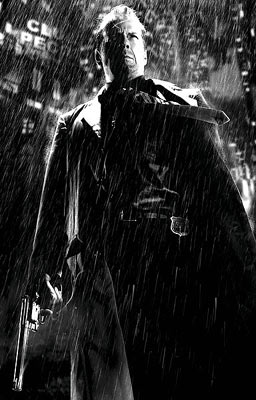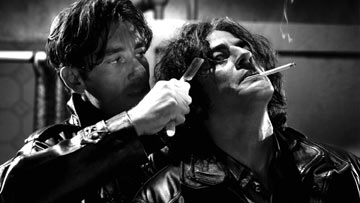Rating
-

Cast & Crew
info:
Jessica Alba
Nancy Callahan
Rosario Dawson
Gail
Elijah Wood
Kevin
Bruce Willis
John Hartigan
Benicio Del Toro
Jack Rafferty
Michael Clarke Duncan
Manute
Carla Gugino
Lucille
Josh Hartnett
The Salesman
Michael Madsen
Bob
Jaime King
Goldie/Wendy
Brittany Murphy
Shellie
Clive Owen
Dwight
Mickey Rourke
Marv
Nick Stahl
Junior/Yellow Bastard
Powers Booth
Senator Roark
Alexis Bledel
Becky
Rutger Hauer
Cardinal Roark
Produced by Elizabeth Avellan, Frank Miller, Robert
Rodriguez, Andrew Rona, Bob Weinstein, Harvey Weinstein,
Brad Weston; Directed by Frank Miller and Robert
Rodriguez; Special Guest Director: Quentin Tarrantino;
Written by Robert Rodriguez; based on the comic
book by Frank Miller
Action/Drama/Mystery
(US); 2005; Rated R for sustained strong stylized violence,
nudity and sexual content including dialogue; Running
Time: 126 Minutes
Official
Site
Domestic Release Date:
April 1, 2005
Review Date
04/01/05 |
 Written
by DAVID KEYES Written
by DAVID KEYES The
metropolis at the heart of "Sin City" is a sensuous
haven of mass corruption and peril, its foundations rooted
in the innocent blood that is spilled across miles of murky
terrain. Characters rise from a cesspit of cruelty and ascend
even more dangerous ladders; they taunt, tantalize and manipulate
each other like criminals without higher authority, and
their moral convictions are seldom about sensibility as
much as they are about foolish and wanton desires. But experience
in the shadows has nonetheless made them survivors, and
when the intensity of their quick-witted instinct kicks
into high gear, narrative conflicts become platforms for
all sorts of social and political intrigue. Many of the
city's more determined citizens also take great pride in
sharing their personal insights with the audience - via
sober voice-overs, they obsess over details, persuade with
colorful analogies ("He had the wrong luck of being
born in the wrong century."), and shamelessly blur
the lines on what constitutes right from wrong. In a place
as merciless as Basin City, however, endurance comes down
to not just stealth or wisdom, but the demand to see only
in terms of black and white. There is no middle ground to
tread here, just one extreme after another. And there comes
a point when you suspect everyone involved likes it that
way, too.
The movie's promotional
tagline is as perfect summarization as one requires: "Walk
down the right back alley in Sin City and you can find anything."
To be sure, a quick glance at any isolated moment included
within the picture divulges a horde of cinematic influences,
including film noir, comic book pop art, apocalyptic sci-fi,
underground crime thriller, and in some regards maybe even
a little hip eccentricity a la Quentin Tarrantino (perhaps
it is no coincidence that he is a "guest director"
here, either). As individual slices these styles stress
the thorough surge of knowledge and preparation that went
into crafting the endeavor, but collectively they become
the embodiment for what is probably one of the most original
and exciting motion picture experiences I have ever had.
Films this brilliant - or more accurately, this intoxicating
and inventive - are elusive wonders in cinema: they operate
on no set standards but their own, and take a path that
is bold enough to not only challenge expectations, but surpass
them as well. It is an accomplishment to be heralded, a
film alive with artistic production values, concentrated
storytelling and layered characterization for over two fully
realized hours. It inspires, it provokes… and most
importantly, it resonates with you long after it is over.
Here is one of the great visionary achievements of our time.
A hefty portion
of the audience will no doubt share this sentiment without
much stipulation. A labor of blood and sweat that was seemingly
destined for the celluloid, it is adapted from a comic book
whose imbedded fan base goes beyond just mere faithfulness;
a sheer mass of admirers often punctuate traditional fanaticism
with in-depth breakdowns of the series' various characters
and plots, their enthusiasm so great that they are often
compared (perhaps rightfully) to the most dedicated "Star
Wars" and "Lord of the Rings" buffs. Their
instant gratification will likely be derived from the visual
approach rather than the storytelling - its painstaking
likeness to specific frames from the actual source material
is wondrous and thoughtful, and lends to the notion that
you are being transplanted from one medium to the next with
the utmost ease. Comic book screen adaptations have become
commonplace in mainstream filmmaking in the recent years,
of course, but no matter how ambitious or productive many
have been, it is always hard for the result to look like
anything other than a full-fledged action picture. Here,
at last, is an endeavor that matches acceptable cinematic
values with the fundamentals of the original medium it was
founded in. The hybrid concept is so fully realized that
mere entertainment seems more like striking art, and you're
dazzled just as much by the movie's picturesque beauty as
you are by the high pitch of adrenaline.
Equally rewarding,
furthermore, is the unusual but compelling narrative approach.
The movie takes place in chapters - multiple stories, each
loosely related but occasionally intersected, are defined
by a level of isolation that makes the film more or less
a hub for numerous segments rather than one linear account
of events. The individual acts also provide more opportunities
to outline specific characters, a prospect that is welcoming
considering the extensive ensemble. Marv (Mickey Rourke),
who is the center of one such episode, is one of the more
immediately engaging; a former criminal turned recluse,
he crosses paths with a beautiful prostitute named Goldie
(Jaime King), seemingly falls in love with her, and then
wakes up the next morning to find her dead in his arms.
But he is not the hooker's murderer. Who was? Ah, but that
is one of several interesting mysteries for the buff outcast
to uncover in his search for answers. Like the other anti-heroes
who sit in the spotlight of "Sin City's" other
brief narratives, there is a lot more to an event than meets
the eye. Sometimes the mysteries lead to big unexpected
reveals, and other times they are halted by dead ends or
mislead instincts.
Other characters
experience very similar turmoil. John Hartigan (Bruce Willis),
a former cop who insists on bringing down a notorious child
kidnapper in the city, is one such character whose task
is not without an occasional speed bump. His core dilemma
comes when he is sent to jail for several years before he's
allowed to finish said task. Yeah, just try having that
kind of patience! Another similar crisis (although perhaps
not as time-excessive) is the one that befalls Dwight (Clive
Owen), a local renegade who is some kind of self-appointed
guardian of Basin City's ladies. When a corrupt cop (Benicio
Del Toro) is killed and the body falls into his hands, it
threatens not only his freedom, but also the safety of several
of the women who were involved in the slaying. The predicament:
does he surrender himself to save those which he claims
he wants to protect, or does he let them take the fall?
The key to victory
here lies in the tactics implored by the characters. Their
methods are anything but orthodox; whereas most superheroes
(or villains) would rather duck behind obstacles when they
are being bombarded by attacks, those who live in this metropolis
meet all danger head-on, seemingly fearless of whatever
fate may have in store for them. They are also not introverted
by any means, especially concerning the viewers, whom they
loosely regard as innocent wanderers in need of some survival
tips. The screenplay's use of first person narration, of
course, is a tool that dates back to the great film noir
of the 1940s (in which foreboding detectives spoke in sharp
metaphors as a way to reveal crucial expository information),
but here the filmmakers utilize it to both stress plot details
as well as soften the subject matter's potentially-harsh
blow. A wise undertaking, to be sure - "Sin City"
is populated by corrupt law enforcement, cannibals, child
rapists, devious politicians and religious leaders, and
prostitutes who take a more hands-on approach in order to
ensure their personal safety on the streets. In other words,
Basin City is not the kind of place you would want to be
visiting while on vacation.
 The
production values, needless to say, suggest otherwise. Director
Robert Rodriguez's glorious black-and-white canvas is a
sensation to behold, often interspersed by a sporadic slice
of color (spilled blood usually has that distinguishing
characteristic), and the way his camera moves in and out
of conversations, elaborate shoot-outs and the occasional
chase sequences is both thrilling and meticulous. His characters,
meanwhile, are decorated just as much by strategic shadows
as they are by blackened wardrobes, and mere facial expressions
seem to change simply by the way the light hits them. The
atmosphere is not without menace or dread, naturally, but
it's not the kind of visual thrust that creates claustrophobia,
if you catch my drift. The players are usually isolated
by an underlying psychosis or conflict, yet there is always
a sense that something more sinister is waiting to spring
from behind a dark alley further down the road. The city
itself is just as much a villain as any of the gun-wielding
misfits that dwell on the inside. The
production values, needless to say, suggest otherwise. Director
Robert Rodriguez's glorious black-and-white canvas is a
sensation to behold, often interspersed by a sporadic slice
of color (spilled blood usually has that distinguishing
characteristic), and the way his camera moves in and out
of conversations, elaborate shoot-outs and the occasional
chase sequences is both thrilling and meticulous. His characters,
meanwhile, are decorated just as much by strategic shadows
as they are by blackened wardrobes, and mere facial expressions
seem to change simply by the way the light hits them. The
atmosphere is not without menace or dread, naturally, but
it's not the kind of visual thrust that creates claustrophobia,
if you catch my drift. The players are usually isolated
by an underlying psychosis or conflict, yet there is always
a sense that something more sinister is waiting to spring
from behind a dark alley further down the road. The city
itself is just as much a villain as any of the gun-wielding
misfits that dwell on the inside.
Rodriguez is,
to be sure, a director who has always had a penchant for
ambitious foregrounds (among other things, he is responsible
for the "Spy Kids" films), but perhaps part of
the payoff this time comes from a different seed: the fact
that he shares directing credits with Frank Miller, the
very man who created this comic book franchise. Being an
experienced (and highly regarded) artist and storyteller
in that published medium, Miller has a unique oversight
here; his stylish thumbprint is etched painstakingly across
the cinematic canvas, and isolated images have such precise
detail to them that it's as if they were lifted directly
from the pages of the books that inspired them. The professional
relationship between both men has been the cause of some
controversy in Hollywood recently (did Rodriguez really
deserve to be axed from the Director's Guild because his
partnership with Frank violated membership bylaws?), but
as is usually the case with filmmakers who make great sacrifices
for the sake of art, their struggle is ultimately their
payoff. "Sin City" is a lot of things - complex,
exciting, sarcastic, challenging and thoughtful, and maybe
even a little nihilistic - but most importantly it is a
picture that reminds us of the limitless potential of the
cinema, and how total perfection is something that happens
only in the most obscure occasions, especially in the recent
years. At long last, here is a film that fully justifies
why we still love going to the movie theater.
© 2005, David Keyes, Cinemaphile.org.
Please e-mail the author here
if the above review contains any spelling or grammar mistakes. |




